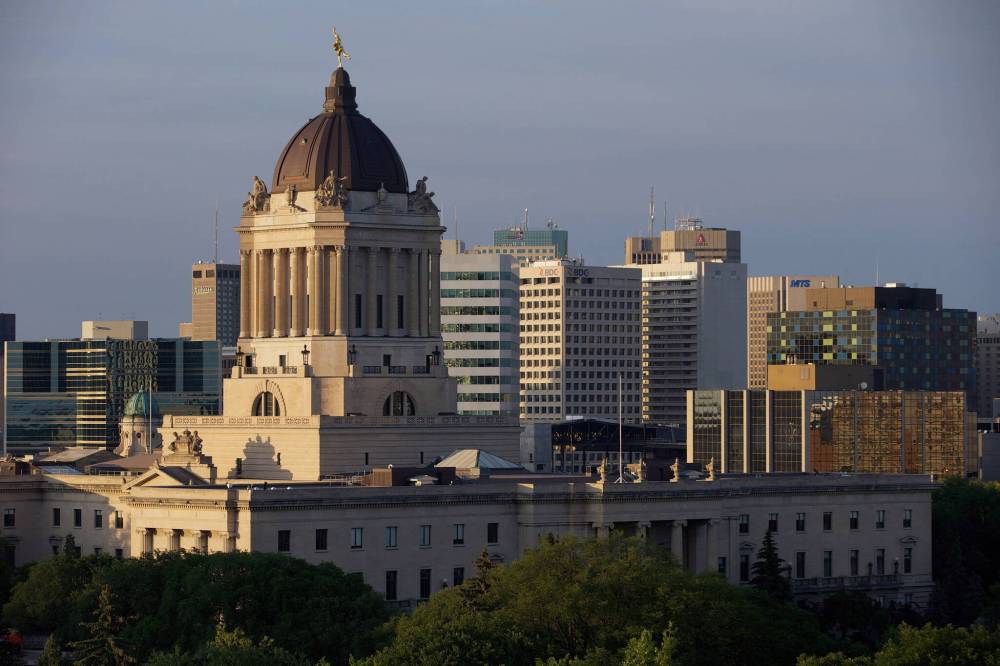Premier Wab Kinew wants to create a new prayer to open sessions of the Manitoba legislature — one that reflects and includes the views of Manitobans of all faiths, as well as atheists.
To do that, he plans to set up a roundtable to consult Manitobans about what kind of prayer they’d like to see prayed before the province’s MLAs get down to business.
If a small online sample of 56 people last week is any indication, what most Manitobans would like is no prayer at all. That was the feeling of 71 per cent of those who offered their opinion about the premier’s idea.

John Woods / The Canadian Press files
The Manitoba Legislative Building
As one person put it: “Prayer doesn’t belong in the legislature. Period.” Said another: “I don’t feel that politics and religion belong together.” Added a third: “Religion has no place in politics.”
In place of prayer, one person suggested perhaps a minute of silent reflection was best “to contemplate about the objectives of the discussion at hand and to engage with respect and politeness.”
A former MLA, who said she was an atheist, chimed in. “I wanted it gone the entire time I was in office,” she said, adding there is “no need for prayer in the Chamber. Save it for your personal time of worship.”
Another person noted that Manitoba public schools have been without prayer to start the day since 1992; why should the legislature still have an opening prayer?
But some were in favour of starting each daily session with an inclusive prayer. “There are many, many spiritual people out there,” said one, adding “a prayer to acknowledge a higher power and an intention to work in alignment with higher principles would be excellent.”
Another suggested something short and direct: “Creator, please help us to be kind and do what’s right for our communities.” Someone else wondered if the province should follow the example of what is done at City Hall. Each council session there opens with a different member of council saying either a prayer, a reading or a meditation.
I asked some Manitoba religious leaders what they would say to the premier.
“United Church policy and belief agree with the premier’s thoughts that prayer should include the entire community, and should reflect the great diversity of paths that lead us to God,” said Julie Graham, regional minister for justice and communication for the Prairie to Pine Regional Council in Manitoba and northwest Ontario.
“Opening words in any public forum should also include space for those who do not follow any religious or faith path,” she added, noting that while the current prayer “has its own beauty,” its wording is “archaic” and “biased towards Christian thought and practice.”
Since it might be impossible to come up with a single prayer that makes everyone feel included, she suggested “a collection of prayers and opening words may ultimately be the best way forward.”
Christine Baronins of the Manitoba Multifaith Council is in favour of the effort to make the public invocation more inclusive and representative.
“Given the vast diversity of cultures and faiths represented in the legislature and in the province, we as Manitobans and people of faith should be willing to take up the challenge and adopt a prayer that better reflects who we are,” she said.
Tanis Moore, sensei of the Manitoba Buddhist Temple, would like to see a different prayer from the various faith traditions used on a rotating basis. “That way there won’t be a suggested prayer that will be very difficult to compose and probably won’t satisfy everyone,” she said.
Archbishop Richard Gagnon of the Archdiocese of Winnipeg agreed. “It is more meaningful to have a variety of prayers to start the legislature rather than some sort of generic one,” he said. “This would respect the multi-faith reality in Manitoba.”
For Tasneem Vali of the Manitoba Islamic Association, there is a danger of whatever is created becoming unremarkable. “I would not want a prayer to become routine and mundane,” she said, adding she would also like to see the premier go further and give thought to how people from non-Christian faiths could get time off work to celebrate their holy days.
Michael Wilson, minister at Charleswood United Church, thinks it would be “an interesting exercise to try and develop an ecumenical statement or prayer to replace the existing one.” But he thinks even just a moment of silence would be just as effective if a new prayer ends up being “so vague and broad as to render it meaningless.”
Wilson is also in favour of a rotation of spiritual teachings, songs, or writings “from the vast array of belief systems practised in the province. The potential of this would be a genuine representation of acceptance of one another, a praxis of loving our neighbour,” he said.
But maybe the last word goes to one online commenter who suggested that, if the tradition of an opening prayer is kept, the best possible prayer for these times might be: “God, help us all. Amen.”
faith@freepress.mb.ca
The Free Press is committed to covering faith in Manitoba. If you appreciate that coverage, help us do more! Your contribution of $10, $25 or more will allow us to deepen our reporting about faith in the province. Thanks! BECOME A FAITH JOURNALISM SUPPORTER

John Longhurst
Faith reporter
John Longhurst has been writing for Winnipeg’s faith pages since 2003. He also writes for Religion News Service in the U.S., and blogs about the media, marketing and communications at Making the News.